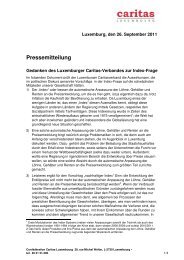- Page 2:
2010 Sozialalmanach Schwerpunkt: Au
- Page 5 and 6:
Sozialalmanach 2010 Sous la directi
- Page 7 and 8:
2. Teil Aus der Krise in die Armut?
- Page 10 and 11:
Vorwort In der humanitären Hilfe i
- Page 12 and 13:
sozialen Zusammenhalt wahren sollte
- Page 14:
Sonst entartet sie und wird zur Gef
- Page 17 and 18:
werden diese Entwicklung aufmerksam
- Page 20:
1. Teil Zur sozialen Lage Luxemburg
- Page 23 and 24:
gelte. Zur effektiven Zukunftsbewä
- Page 25 and 26:
Umweltpolitik, Klimaschutz und nach
- Page 27 and 28:
Vor allem aber fällt auf, dass die
- Page 29 and 30:
Halten wir fest, das in diesem Regi
- Page 31 and 32:
Im Bereich Umwelt heißen die groß
- Page 33 and 34:
im Hinblick auf eine Gesetzesänder
- Page 35 and 36:
Entwicklungsgesellschaft, stehen au
- Page 37 and 38:
2) Zusatzkosten reduzieren, die in
- Page 39 and 40:
-- Übergangslösungen, die verhind
- Page 41 and 42:
-- Durch Kombilohn-Systeme (Bsp. Ge
- Page 43 and 44:
-- Ausbau der gerade neu geschaffen
- Page 45 and 46:
zielgebundenen Nutzung der staatlic
- Page 47 and 48:
-- abgewiesene Asylbewerber sollten
- Page 49 and 50:
-- die Sensibilisierungsarbeit in L
- Page 52 and 53:
3. Armut und soziale Gerechtigkeit
- Page 54 and 55:
so ergeben sich Äquivalenzeinkomme
- Page 56 and 57:
gewusst ist, dass ein engerer Zusam
- Page 58 and 59:
tive und inklusive Sozialpolitik ge
- Page 60:
CARITAS EUROPA (2010): Armut mitten
- Page 63 and 64:
perte. Sinon ce serait la mise en r
- Page 65 and 66:
investissements spéculatifs très
- Page 67 and 68:
Celui qui se rend à Mondorf au Cas
- Page 69 and 70:
GOUVERNEMENT LUXEMBOURGEOIS (2008)
- Page 71 and 72:
le rétablissement de l’équilibr
- Page 73 and 74:
28,7 mio. € sans oublier ceux ins
- Page 75 and 76:
se fait maintenant, cela rapporte c
- Page 77 and 78:
tireront. Chercheront-ils des solut
- Page 79 and 80:
dass es deshalb auch schwierig sei,
- Page 81 and 82:
Tripartite zu hören war, beabsicht
- Page 83 and 84:
-- Aktive Arbeitsmarktpolitiken, da
- Page 85 and 86:
in den nächsten Monaten solche Ind
- Page 87 and 88:
CSDD (2008): Stellungnahme des CSDD
- Page 90:
Etudes sélectionnées du service C
- Page 93 and 94:
este la lutte contre la pauvreté p
- Page 95 and 96:
Sont également reconnus comme bén
- Page 97 and 98:
Tableau 4 : Ménages avec enfant(s)
- Page 99 and 100:
3.3 Bénéficiaires d’une indemni
- Page 101 and 102:
3.3.2 Les ménages avec enfants Com
- Page 103 and 104:
Graphique 2 : Situation monétaire
- Page 105 and 106:
Pour chacune de ces unités familia
- Page 107 and 108:
Graphique 4 : Revenu mensuel total
- Page 109 and 110:
Graphique 5c : Revenu mensuel total
- Page 111 and 112:
Graphique 6a : Revenu mensuel total
- Page 113 and 114:
5. Quid d’un deuxième salaire da
- Page 115 and 116:
Enfants âgés de 12 ans et plus 2
- Page 117 and 118:
deux en profitent), ont toujours dr
- Page 119 and 120:
au sein d’un ménage. Cette const
- Page 121 and 122:
Parmi les discriminations les plus
- Page 123 and 124:
-- celle du 29 juin 2000 : la direc
- Page 125 and 126:
en 2006 15 . Pour le Luxembourg, ce
- Page 127 and 128:
que la crise aura un impact négati
- Page 129 and 130:
groupe auquel il appartient. Cela f
- Page 131 and 132:
COMMISSION EUROPEENNE (2008) : La d
- Page 133 and 134:
Wie sieht denn Kinderarmut im ‚re
- Page 135 and 136:
eträgt dieser Anteil bei den Luxem
- Page 137 and 138:
Ein Kind wird in eine Lebenslage hi
- Page 139 and 140:
(Klima, kindzentrierte Alltagsgesta
- Page 141 and 142:
unbedingt dem Tatbestand der akuten
- Page 143 and 144:
Das ONE könnte im Sinne der Armuts
- Page 146:
2. Teil Aus der Krise in die Armut?
- Page 149 and 150:
mortgage defaults and rising insolv
- Page 151 and 152:
egulation, economic growth, levels
- Page 153 and 154:
Depression gave rise to Keynesian e
- Page 155 and 156:
economies. The key goal of neo-libe
- Page 157 and 158:
the European Union (EU) have undert
- Page 159 and 160:
linking the amount of benefits rece
- Page 161 and 162:
female employment growth came much
- Page 163 and 164:
has been more rapid, and the willin
- Page 165 and 166:
capacities of the real economy. The
- Page 167 and 168:
The above three features of loose m
- Page 169 and 170:
eturned to the top of the political
- Page 171 and 172:
despite its successes, the G20 has
- Page 173 and 174:
ideological strife and polarising a
- Page 175 and 176:
Eastern Europe, surely puts a break
- Page 177 and 178:
Integrate migrants through particip
- Page 179 and 180:
maintaining general financial stabi
- Page 181 and 182:
social protection. What these obser
- Page 183 and 184:
FERRARA, MAURIZIO & HEMERIJCK, ANTO
- Page 185 and 186:
PIERSON, PAUL (1998): Irresistible
- Page 188 and 189:
Croissance économique et cohésion
- Page 190 and 191:
pas fixer le seuil de pauvreté à
- Page 192 and 193:
Lien entre taux de pauvreté, reven
- Page 194 and 195:
sur la croissance économique « qu
- Page 196 and 197:
et donc le taux de pauvreté et ils
- Page 198 and 199:
Conclusion générale Dans ce papie
- Page 200 and 201:
Die Staatsfinanzen nach 2010 L U C
- Page 202 and 203:
Dass da der Luxemburger Staat sich
- Page 204 and 205:
abzuwälzen. Fraglich ist allerding
- Page 206 and 207:
damit Einsparungen in Höhe von 8%
- Page 208 and 209:
imstande sein wird, die gewohnte Ro
- Page 210 and 211:
The financial system’s contributi
- Page 212 and 213:
free-enterprise and private propert
- Page 214 and 215:
In short, governments are in princi
- Page 216:
At best, we can therefore hope for
- Page 219 and 220: Il coule de source que l’ampleur
- Page 221 and 222: B. Les causes de la pauvreté liée
- Page 223 and 224: mettre en place dans un avenir rapp
- Page 225 and 226: Il convient de saluer dans ce conte
- Page 227 and 228: constant que les personnes ne dispo
- Page 230 and 231: Crise en W ? M A R C O W A G E N E
- Page 232 and 233: Des inégalités et la perte du pou
- Page 234 and 235: Or, l’OCDE publia non seulement u
- Page 236 and 237: critiquée puisqu’elle accorde la
- Page 238 and 239: éfléchir plus de deux fois avant
- Page 240 and 241: cohésion sociale et au développem
- Page 242 and 243: zones témoins (où le RSA n’éta
- Page 244 and 245: Die Chance des Neuanfangs M I K E M
- Page 246 and 247: Dies ist nicht nur eine Katastrophe
- Page 248 and 249: Was bedeutet ein Wachstum von 4%? D
- Page 250 and 251: 2. Unseren ökologischen Fußabdruc
- Page 252 and 253: 3. Arbeit teilen Vollbeschäftigung
- Page 254 and 255: Friedensmissionen freikaufen, genau
- Page 256: wäre dementsprechend nicht gleichb
- Page 259 and 260: sometimes their homes. A spiral of
- Page 261 and 262: And economic resilience really does
- Page 263 and 264: Perhaps the most telling point of a
- Page 265 and 266: Flourishing - within Limits Fixing
- Page 267: are grouped into three main themes
- Page 271 and 272: höchst altmodisch mit Platons, Kan
- Page 273 and 274: Für Platon/Aristoteles war der ein
- Page 275 and 276: „Ob der Mensch, in bösem Übermu
- Page 277 and 278: A cliché of the present discussion
- Page 279 and 280: egoism. 5 The ‘real economy’ of
- Page 281 and 282: usiness collapsed and the wife lost
- Page 283 and 284: it systematically destroys the basi
- Page 285 and 286: 3. Ethical critique of the market:
- Page 288: 3. Teil Die soziale Entwicklung Lux
- Page 291 and 292: Toutes les données illustrées dan
- Page 293 and 294: % 30 1) Taux de risque de pauvreté
- Page 295 and 296: 5) Taux de risque de pauvreté mon
- Page 297 and 298: 9) Taux de risque de pauvreté mon
- Page 299 and 300: 12) Coefficient de Gini dans l’UE
- Page 301 and 302: % 12 16) Taux de chômage dans l’
- Page 303 and 304: 20) Évolution du taux de chômage
- Page 305 and 306: 24) Jeunes ayant quitté prématur
- Page 307 and 308: Autorenverzeichnis Serge Allegrezza
- Page 309 and 310: Sozialalmanach 2007 Schwerpunkt: So
- Page 311: Sozialalmanach 2009 Schwerpunkt: Na








